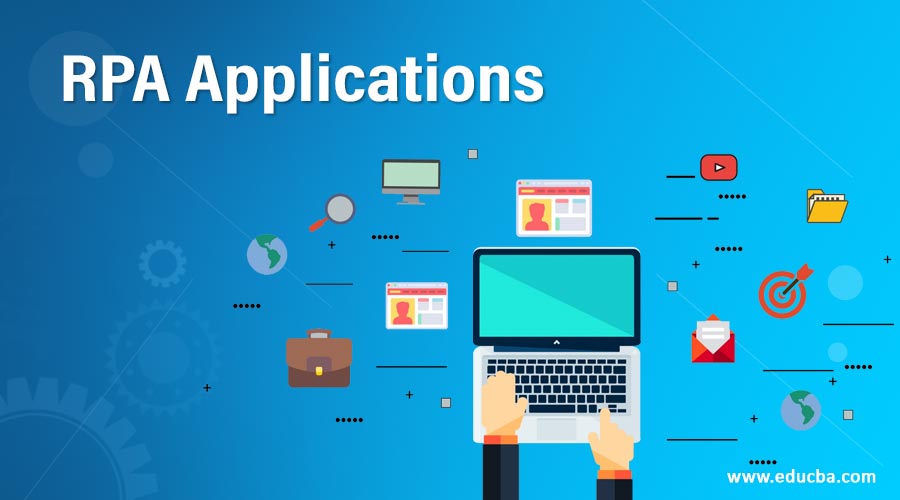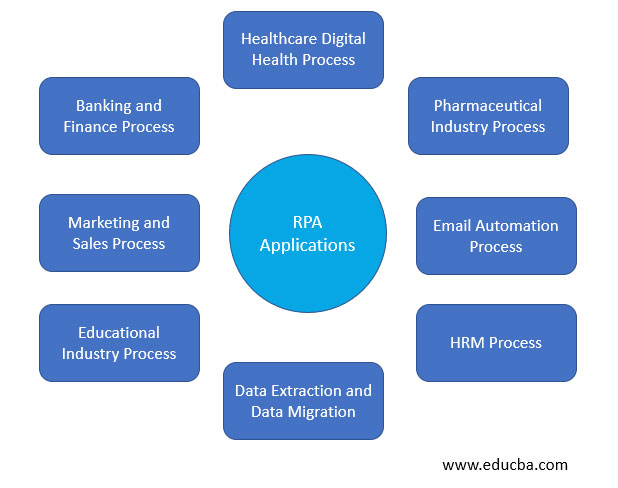Updated May 31, 2023
Introduction to RPA Applications
RPA applications are business use cases that can be implemented through robotic process automation technologies. RPA enables automation and faster processing of business applications through robotic software and configurations. RPA applications guarantee consistent business productivity by automating rule-based, recurrent tasks associated with processes.
Several industry-specific RPA implementations related to the banking and finance industry, Insurance, healthcare, retail, telecom, and educational business domains are feasible. RPA uses software-based bots to process the workflows and depend on the steps of the business applications. Several software vendors exist, such as Blueprism, OpenRPA, and Pega Robotic Automation.
Top 11 RPA Applications
In the industry, various RPA applications are utilized to automate business processes. We will discuss some of the popular applications and uses of RPA technology. Following is a pictorial representation of RPA applications.
1. Marketing and Sales Process Automation
Marketing and Sales process automation is a primary use case for RPA that helps automate each sales application component dealing with Lead generation, prospecting, and campaign management. Collaborative use of RPA with Artificial Intelligence (AI) and cognitive technologies can be employed for sales forecasting. RPA applications are useful in various areas, including market and client research, customer relationship management (CRM), customer onboarding processes, and brand monitoring. The RPA application helps to boost productivity in sales and increases customer satisfaction. Moreover, RPA applications provide managed governance and data security, enabling continuous business.
2. Price Tracking and Comparison
RPA technologies are highly in demand and implemented in the financial and retail industries. Software bots extract the data from several sources and systems of multiple competitive products and compare the price data to generate automatic reports and alert notifications based on the business rules for setting the pricing. The RPA bots can identify the optimal and best pricing through the automatic tracking and comparison technique. RPA application implementation enables enterprises to achieve competitive intelligence and price monitoring that results in growth in market share by real-time competitor web monitoring.
3. Procure to Pay
Companies can use RPA applications with Procure to Pay to achieve seamless and time-efficient procurement of goods and services. Settlement of accounts payable invoices by integrating various enterprise resource planning software (ERP) and accounts systems with RPA technologies to automate the business works flow. Some of the RPA application enables the automation of the approval and notification process for procurement. The RPA bots eliminate most manual processes and data and process integration gaps between the interrelated systems.
4. Data Extraction and Migration
RPA is a standard tool used in data management to automate data extraction and migration processes. Most organizations use their or external workforce to process the data manually, such as data entry, data format conversion, and data replication tasks. RPA can enable the process of migrating data from one system to another. RPA bots can migrate data from a CRM system to an ERP system.
5. Data Quality Check
Data quality check is the process of checking data and business validation rules validations that are automated through RPA bots. These are very useful for quality and reduce the risk of data inconsistencies and mismatch issues across the systems. RPA also assists in testing and quality assurance aspects of the software that require rules-based testing and establishing an appropriate testing environment, along with the test data.
6. Invoice Generation
Invoice generation is the process that every business uses as part of the financial aspects. RPA is a key technology implementation to automate the invoice generation process. It efficiently ensures the quality and accuracy of the invoices sent to the customers and vendors. RPA bots connect to various CRM, SRM, and sales systems to collect the data and generate the invoices promptly configured by the business houses.
7. Email Automation
Several implementations are happing for automating the mass email for digital promotions or email marketing. The RPA application uses email-based software to automate sending bulk emails with less time and avoids the risk of manual errors. RPA also applies to email, helpdesk requests, order entries, invoices, bills, recurring statements, or reminder emails associated with several services and product industries. RPA can be integrated with popular email service engines like Outlook, Google Email, and other email exchange services and tools such as MS Excel, MS Word, SharePoint, Google Sheets, and active directories commonly used in organizations.
8. Accounts Reconciliation
Accounts reconciliation is a recurring and important task in the accounting and finance industry. The business uses RPA bots and technologies automation tools to process the reconciliation for accounts by comparing various documents such as statements, balance sheets, cash books, and receipts.
9. Report Generation
RPA technologies are widely used for generating reports that can be reused to track and reconcile business processes and performance. Some Popular reports are sales and revenue reports and opportunity tracking reports. RPA bots can integrate with several business applications and Business Intelligence (BI) systems to generate reports on-demand or at regular intervals.
10. Payroll and Human Resource Management
RPA applies to most Human resource management (HRM) process automation such as employee onboarding, generating the payroll, calculating the compensation and processing payment, generating and sharing the payslips, and other documents. RPA helps expedite the process with automated workflows and approval processes.
11. Compliance Management
Companies in healthcare, modern-day digital health, digital banking and finance, the pharmaceutical industry, and insurance businesses that produce enormous amounts of data can use RPA for compliance management. RPA bots help the organization in the audit and compliance validation process, which is crucial for business governance.
Conclusion
RPA applications help the workforce associated with other productive business works by saving time and reducing manual dependency overheads. It helps improve the process’s quality and reduces the risk of manual errors. RPA applications are evolving with advanced features, and new business domains are integrating into these applications.
Recommended Articles
This is a guide to RPA Applications. Here we discuss the introduction and the top 11 RPA applications in detail. You can also go through our other related articles to learn more –




